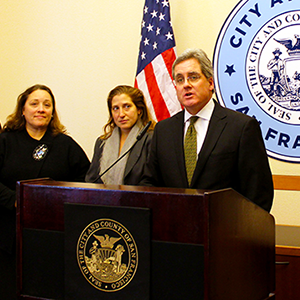ACCJC openly defied a federal requirement to provide a detailed report that ‘clearly identifies any deficiencies,’ City Attorney tells panel

SAN FRANCISCO (Sept. 28, 2015)—The private commission bent on terminating City College of San Francisco’s accreditation acted in blatant defiance of a federal requirement that accreditors provide colleges with “a detailed written report that clearly identifies any deficiencies,” according to City Attorney Dennis Herrera’s written comments to the U.S. Department of Education.
The Novato, Calif.-based Accrediting Commission of Community and Junior Colleges, or ACCJC, is currently facing scrutiny from an influential federal advisory committee charged with making recommendations to the U.S. Secretary of Education about educational accreditation matters. Recommendations that the National Advisory Committee on Institutional Quality and Integrity can make to Secretary of Education Arne Duncan include whether specific accrediting agencies are federally recognized. NACIQI has invited comments on the ACCJC as part of a process that will include public hearings in Washington, D.C. later this year.
In his written comments to U.S. Department of Education authorities, Herrera took aim at a key violation exposed in his August 2013 civil suit against the ACCJC. Noting that the accrediting commission “refused to even acknowledge” its duty to identify purported deficiencies when it pushed measures virtually assuring City College’s closure, Herrera quoted San Francisco Superior Court Judge Curtis E.A. Karnow’s Feb. 17, 2015 decision, which held that ACCJC’s redefinition of “deficiency” was “not a reasonable interpretation.”
“However, in order to defend its decision to terminate City College’s accreditation—a decision that was based in part on the alleged failure to meet standards that ACCJC expressly told City College it had met—the ACCJC redefined the term ‘deficiencies,’ and then repeatedly took the position that it has no obligation to inform an institution that it fails to meet a standard,” Herrera wrote in the Sept. 24 letter.
Herrera went on to note “that the ACCJC expects institutions to read the Commission’s mind and glean deficiencies from subtle clues—hardly the ‘detailed written report that clearly identifies any deficiencies’ required by regulation.”
Herrera sued the ACCJC in San Francisco Superior Court on Aug. 22, 2013, alleging unfair and unlawful practices in the accrediting agency’s evaluation of City College. Months later, after a series of procedural delays by the accreditors’ attorneys, Herrera filed a high-stakes motion for preliminary injunction to block the ACCJC from moving forward with its plans to terminate the college’s accreditation. Judge Karnow granted the major portion of Herrera’s motion on Jan. 2, 2014, preliminarily enjoining the ACCJC from finalizing its planned termination of City College’s accreditation during the course of the litigation.
On Jan. 16, 2015, Judge Karnow issued a detailed 72-page ruling that found ACCJC had engaged in “significant unlawful practices” in reaching its 2013 decision to terminate City College’s accreditation. The ruling vindicated Herrera’s decision to file the lawsuit, which was harshly criticized by the San Francisco Chronicle and even some city leaders. The outcome offered City College a new option to secure its accreditation, and included tough injunctive provisions to assure a fairer, more transparent process for the college moving forward.
The ACCJC took its first public step to terminate City College’s accreditation in June 2012, when the private commission unexpectedly issued the harshest sanction an accreditation process can produce: a “show cause” letter, placing the burden on the college to prove why its accreditation should not be terminated. A year later, in June 2013, despite significant progress to address the deficiencies identified by accreditors, the commission announced its intention to terminate City College’s accreditation effective July 31, 2014. Such a termination would have made City College’s closure a virtual certainty, had Herrera’s injunction not blocked the ACCJC from moving forward.
The case is: People of the State of California ex rel. Dennis Herrera v. Accrediting Commission for Community and Junior Colleges et al., San Francisco Superior Court No. 13-533693, filed Aug. 22, 2013.